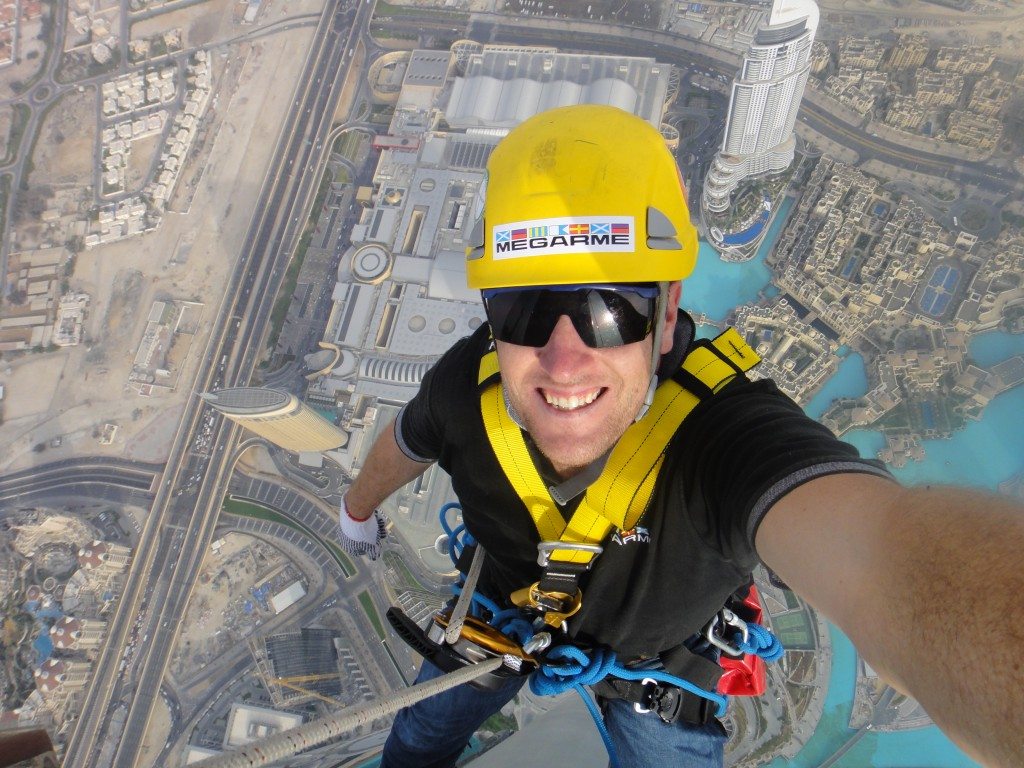You’re a project manager nearing completion on one of the region’s tallest buildings but there is a tile missing, a bulb which needs replacing, or a window pane broken. Sending site workers to repair the problem isn’t an option, but the job still needs doing. Who do you call?
Rope access specialists Megarme are a 300 strong company with teams of skilled technicians whose expertise ranges across a number of disciplines. Having worked on projects such as Dubai’s Atlantis Hotel and Burj Al Arab; Bahrain World Trade Centre; oil rigs and even the world famous Burj Khalifa, they really do reach the parts nobody else can reach.
“We are known as the access specialists,” says head of business development Daniel Gill.
“Where there are challenging areas of buildings; over hangs, under hangs, decking systems, where traditional access cannot reach, we tend to provide the solutions. Because we are manpower orientated we can arrive on site and be mobilised in a matter of minutes. It’s all nonconventional access,” he explains, adding: “There are cleaning companies out there who have rope access capabilities, but we are a rope access company with cleaning capabilities.”
“We cover a huge array of trades and disciplines that just happen to be done from a rope,” Gill adds, with some of the more bizarre projects including changing the bulb in the aircraft warning light on the top of the 240 metre Bahrain World Trade Centre.
Projects
Megarme’s team was called in at the final stages of construction at the 414 metre Princess Tower, Dubai Marina, to install the final, and highest, panels; inaccessible because the building is square with a step-in to the dome.
When the Atlantis Hotel was damaged by fire, Gill coordinated a team within days and spent five weeks on site. Recalling the project as a personal favourite, Megarme painted the complete archway and facade, provided structural assistance and also repaired areas water damaged by fire fighters.
For the Yas Marina Hotel in Abu Dhabi, Megarme installed lights and glass panels, working around the clock to meet another tight deadline. Gill recalls his other career highlights as including the – relatively low – Dubai Metro.
“We’re the largest IRATA rope access company in the world; we’re the first port of call when it comes to problem solving, so that usually leaves us in good stead for more of the predominant projects out here. At some stage we’re involved,” Gill says.
Sense of danger
Statistically, working in the industrial rope access business is safer than travelling to site.
Strictly governed by the International Rope Access Trade Association (IRATA), each member of the team is secured
with two ropes, ready to either ascend or descend to the required point on the building, rig, tower or bridge.
The highest point on the structure is accessed by lift, then stairs or ladder, with harnesses and attachment points used to reach the final rigging point.
The most senior person on site — who must hold the IRATA level three qualification — is then responsible for securing the ropes the team will work from.
Gill says he would much rather prefer to be attached to Megarme’s ropes than a cradle — where the user is dependent upon how the equipment has been stored and maintained by the third party — adding that it is the simplicity of the equipment, which makes it so safe.
“I always enjoyed the extreme side of life, but I never intended getting into industrial rope access when I left school,” Gill admits.
With a construction background, Gill says he met Megarme managing director Billy Harkin by chance, having arrived in Dubai to realise that he was over-qualified to work onsite but under-qualified to work off.
“My background is construction so I came to Dubai with a slightly false impression of what to expect. I just saw 80% of the world’s cranes and a construction project on every corner, but when I arrived I found I actually fit slap bang into avoid that had zero requirement out here.”
Having now “inadvertently discovered his passion”, Gill says he can’t imagine doing anything else.
Racing towards the sun
Despite vast experience defying gravity on some of the world’s most iconic structures, Gill says he “certainly got his kicks” working on the very top of the Burj Khalifa.
“We were at 828 metres; you don’t get much higher,” he says, recalling how he even stood on the highest point of the spire.
Having spent more than two months scaling the record breaking tower, Gill worked with the team tasked with cleaning the entire facade and installing some of the fireworks for the official launch in January 2010 — a deadline that was looking impossible to meet until Megarme arrived.
“When Tom Cruise did his abseil on the tower, a lot of online forums and blogs took what he did in a negative light. They highlighted the fact that guys do this day in and day out in the sweltering heat for nowhere near as much recognition,” Gill says.
“I know how hard our guys work and it is incredibly hard work; mentally and physically draining. They are recognised within the company, but I’m just pleased to be involved in any project we find solutions for.”

